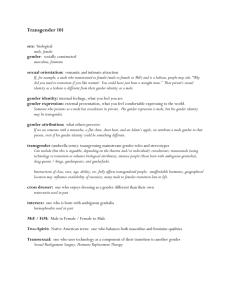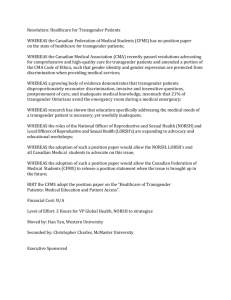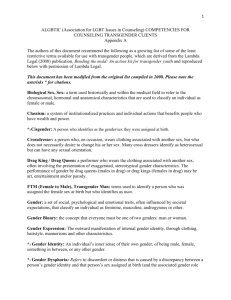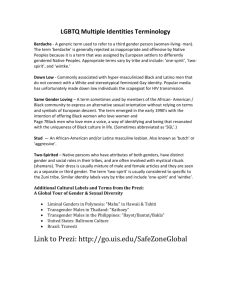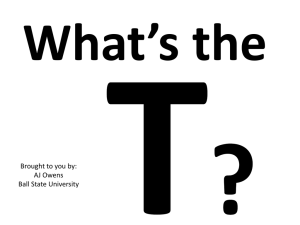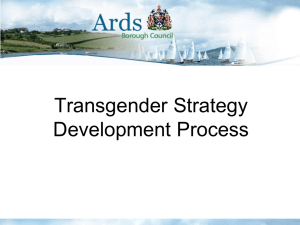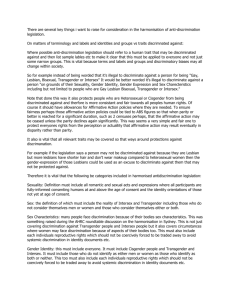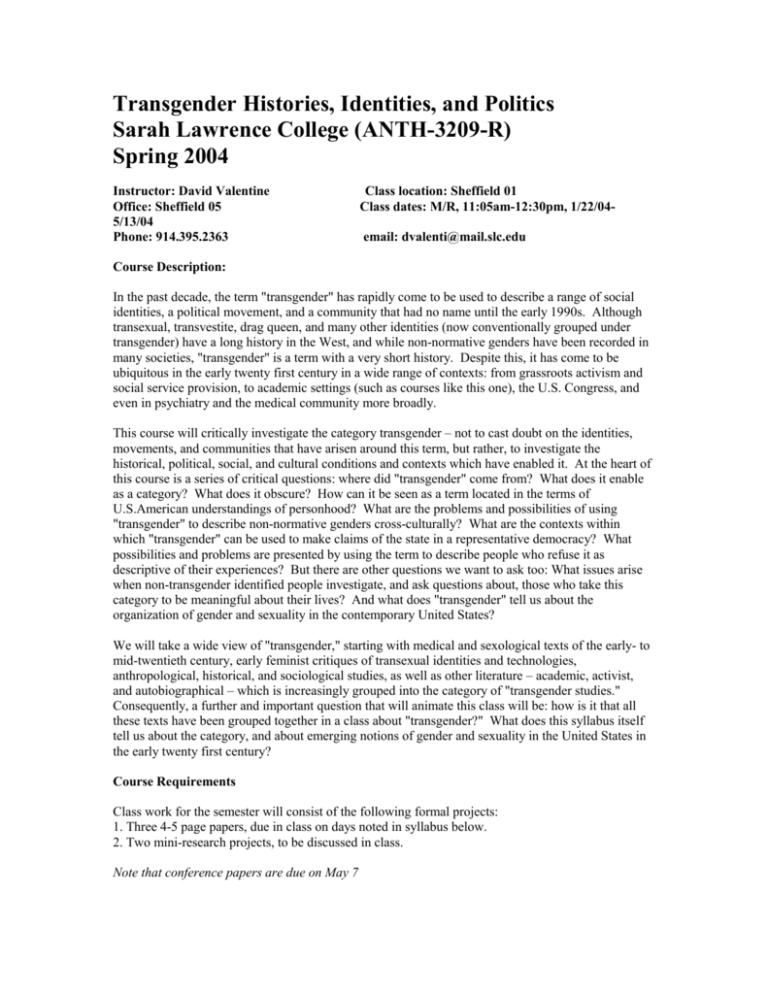
Transgender Histories, Identities, and Politics
Sarah Lawrence College (ANTH-3209-R)
Spring 2004
Instructor: David Valentine
Office: Sheffield 05
5/13/04
Phone: 914.395.2363
Class location: Sheffield 01
Class dates: M/R, 11:05am-12:30pm, 1/22/04email: dvalenti@mail.slc.edu
Course Description:
In the past decade, the term "transgender" has rapidly come to be used to describe a range of social
identities, a political movement, and a community that had no name until the early 1990s. Although
transexual, transvestite, drag queen, and many other identities (now conventionally grouped under
transgender) have a long history in the West, and while non-normative genders have been recorded in
many societies, "transgender" is a term with a very short history. Despite this, it has come to be
ubiquitous in the early twenty first century in a wide range of contexts: from grassroots activism and
social service provision, to academic settings (such as courses like this one), the U.S. Congress, and
even in psychiatry and the medical community more broadly.
This course will critically investigate the category transgender – not to cast doubt on the identities,
movements, and communities that have arisen around this term, but rather, to investigate the
historical, political, social, and cultural conditions and contexts which have enabled it. At the heart of
this course is a series of critical questions: where did "transgender" come from? What does it enable
as a category? What does it obscure? How can it be seen as a term located in the terms of
U.S.American understandings of personhood? What are the problems and possibilities of using
"transgender" to describe non-normative genders cross-culturally? What are the contexts within
which "transgender" can be used to make claims of the state in a representative democracy? What
possibilities and problems are presented by using the term to describe people who refuse it as
descriptive of their experiences? But there are other questions we want to ask too: What issues arise
when non-transgender identified people investigate, and ask questions about, those who take this
category to be meaningful about their lives? And what does "transgender" tell us about the
organization of gender and sexuality in the contemporary United States?
We will take a wide view of "transgender," starting with medical and sexological texts of the early- to
mid-twentieth century, early feminist critiques of transexual identities and technologies,
anthropological, historical, and sociological studies, as well as other literature – academic, activist,
and autobiographical – which is increasingly grouped into the category of "transgender studies."
Consequently, a further and important question that will animate this class will be: how is it that all
these texts have been grouped together in a class about "transgender?" What does this syllabus itself
tell us about the category, and about emerging notions of gender and sexuality in the United States in
the early twenty first century?
Course Requirements
Class work for the semester will consist of the following formal projects:
1. Three 4-5 page papers, due in class on days noted in syllabus below.
2. Two mini-research projects, to be discussed in class.
Note that conference papers are due on May 7
Class work is due in class on the days noted in the syllabus below. I do not grant extensions other
than for exceptional circumstances. If you believe you are embroiled in such a circumstance, I expect
you to request an extension at least a day before the paper is due; DO NOT come to class without
completed work unless I have granted you an extension. I am always willing to look at drafts of your
work up until two days before the due date, which you may email me. I will not, however, accept
emailed versions of your papers.
Conferences
I am very serious about conference work, and assume that you will be too. I expect that you will
complete the tasks we have agreed on for your conference work prior to your conference. Please:
always bring hard copy of your bibliographies or other assignments to your conferences.
Policy on Lateness and Attendance
Please pay particular attention to the following: you are, naturally, expected to attend all classes and
conferences associated with this class. It is expected that if you have to miss a class for a valid reason
(such as illness or family emergency), you will inform me prior to the class, or as soon thereafter as is
possible. Since this is a seminar, your attendance and participation in class discussions is a central
part of the course. I will take attendance in the first ten minutes of class. If you arrive late for class,
you will not have the opportunity to sign the attendance sheet, and this will be noted as an absence.
Please note the attendance policy: more than two unexcused absences will result in reduced credit for
this course.
Required Texts:
The following books are required for the course and are available at the university bookstore. In
addition, assigned books and course readings are available in the reserve library, and the course
readings are also available as a packet from me.
Feinberg, Leslie
1996 Transgender warriors: making history from Joan of Arc to Dennis Rodman. Boston: Beacon.
Meyerowitz, Joanne
2002 How Sex Changed: A History of Transsexuality in the United States. Cambridge: Harvard
University Press.
Rubin, Henry
2003 Self-made men: identity and embodiment among transsexual men. Vanderbilt University Press.
Wilchins, Riki Anne
1997 Read my lips: sexual subversion and the end of gender. Ithaca, NY: Firebrand Books.
Recommended Texts and Resources:
Bornstein, Kate
1994 Gender outlaw: on men, women, and the rest of us. New York: Vintage.
Bornstein, Kate
1998 My gender workbook: how to become a real man, a real woman, the real you, or something else
entirely. New York: Routledge.
Currah, Paisley and Shannon Minter
2000 Transgender equality: a handbook for activists and policymakers. Washington, D.C.: The Policy
Institute of the National gay and Lesbian Task Force and the National Center for Lesbian Rights
(http://www.ngltf.org/downloads/transeq.pdf).
Califia, Pat
1997 Sex changes: The politics of transgenderism. San Francisco: Cleis Press
Namaste, Viviane K.
2000 Invisible lives: the erasure of transsexual and transgendered people. Chicago: University of
Chicago Press.
Supplementary reading list and resource list
As the contention of this course is that “transgender” is a mobile discourse and set of practices, it will
make sense for class members to subscribe to and follow a range of on-line discussions and web
pages. The internet has been a central site for the development of transgender communities and
discourses about transgender-related issues. Students are encouraged to subscribe to the following
lists, and utilize the following webpages for their research, as well as keeping the class informed about
new on-line resources they discover:
Lists to subscribe to:
http://www.tgender.net/mailman/listinfo (GAIN News)
http://www.tgender.net/mailman/listinfo/ita-announce (It’s Time America! listserv)
http://www.jiscmail.ac.uk/lists/trans-theory.html (Trans theory list)
soc.support.transgender (usenet group)
alt.transgender (usenet group)
Organizations:
http://www.amboyz.org (American Boyz)
http://www.ftmi.org (FTM international)
http://www.nyagra.tripod.com (New York Association for Gender Rights Advocacy)
http://www.gpac.org(GenderPAC)
http://www.tgender.net/ita/ (It’s Time America!)
http://www.isna.org (Intersex Society of North America)
http://www.ifge.org (International Foundation for Gender Equality)
Bibliographic Resources:
http://www.sexuality.org/transgen.html
http://www.tgfmall.com/info/Biblio.html
Course Outline
1. Introduction to the Course: Theories, Ethics, Problems, Positioning (1/22/04)
Readings:
Hale, Jacob
nd Suggested rules for non-transsexuals writing about transexuals, transexuality, transexualism, or
trans______.
Wilchins, Riki Ann
1997 Why this book and 17 things you don't say to a transexual. In Read my lips: sexual subversion
and the end of gender. Ithaca: Firebrand books
Part 1: Policing from Without: Medicine, Sexology, Feminism
2. Medicine and Gender Variance I (1/26/04)
Readings:
Hirschfeld, Magnus
1991[1910] Transvestites: the erotic drive to cross dress. Translated by Michael A. Lombardi-Nash.
Intro by Vern Bullough. Buffalo: Prometheus Books. (pp.17-32, 124-154, 417-424)
Weeks, Jeffrey,
1985 Sexuality and its discontents: meanings, myths and modern sexualities. London and New York:
Routledge and Kegan Paul. (chapter 4)
Hekma, Gert
1994 "A female soul in a male body": sexual inversion as gender inversion in nineteenth-century
sexology. In Third sex, third gender: beyond sexual dimorphism in culture and history. Gilbert Herdt
(ed.) pp.213-239. New York: Zone books.
3. Medicine and Gender Variance II (1/29/04)
Readings:
** Project 1 due in class (definitions of
transgender)**
Meyerowitz, Joanne
2002 How Sex Changed: A History of Transsexuality in the United States. Cambridge: Harvard
University Press.
(Introduction, Chapters 1 and 2)
4. Medicine and Gender Variance III ((2/2/04)
Readings:
Meyerowitz, Joanne
2002 How Sex Changed: A History of Transsexuality in the United States. Cambridge: Harvard
University Press.
(Chapters 3 and 4)
Harry Benjamin International Gender Dysphoria Association (HBIGDA)
1985 Standards of Care: the hormonal and surgical sex reassignment of gender dysphoric persons.
Archives of Sexual Behavior 14(1):79-90
Harry Benjamin International Gender Dysphoria Association (HBIGDA)
1998 The standards of care for gender identity disorders. Fifth Edition. Harry Benjamin International
Gender Dysphoria Association. (http://www.tc.umn.edu/~colem001/hbigda/hstndrd.htm)
5. Feminist Accounts of Transgenderism I: The Transexual Umpire (2/5/04)
Readings:
Rubin, Henry
2003 Self-made men: identity and embodiment among transsexual men. Vanderbilt University Press.
(Chapter 3)
Raymond, Janice
1996 The Politics of Transgenderism. In Blending Genders: Social Aspects of Cross-Dressing and
Sex-Changing. Richard Ekins and Dave King (eds). New York: Routledge.
Jeffreys, Sheila
1996 Heterosexuality and the desire for gender. In Theorizing heterosexuality: telling it straight.
Diane Richardson (ed.) Pp.75-90. Oxford: Oxford University Press.
6. Feminist Accounts of Transgenderism II: After Raymond (2/9/04)
Readings:
Wilchins, Riki Ann
1997 The Menace statement to Janice Raymond. In Read my lips: sexual subversion and the end of
gender. Ithaca: Firebrand books
Stone, Sandy
1991 The empire strikes back: a posttranssexual manifesto. in Body guards: the cultural politics of
gender ambiguity. Julia Epstein and Kristina Straub (eds). pp280-304. New York: Routledge.
Heyes, Cressida J.
2003 Feminist Solidarity after Queer Theory: The Case of Transgender. Signs 28(4):1093-1120
Part II: Borders and Differences
7. Sorting out: Who's "Gay" and Who's "Transgender"? (2/12/04)
Readings:
**PAPER 1 DUE IN CLASS**
Meyerowitz, Joanne
2002 How Sex Changed: A History of Transsexuality in the United States. Cambridge: Harvard
University Press. (Chapter 5)
Valentine, David
2002 “We’re not about gender”: the uses of “transgender.” In Out in theory: the emergence of lesbian
and gay anthropology. Ellen Lewin and William L. Leap (eds). pp.222-245. Urbana: University of
Illinois Press.
8. Policing Transexuality/Homosexuality in Children (2/16/04)
Readings:
Feder, Ellen
1997 Disciplining the family: the case of gender identity disorder. Philosophical Studies 85:195-211.
Sedgwick, Eve Kosofsky
1993 How to bring your kids up gay. In Fear of a queer planet: queer politics and social theory.
Michael Warner (ed). Pp.69-81. Minneapolis: University of Minnesota Press.
Minter, Shannon
1997 Diagnosis and treatment of gender identity disorder in children. In Sissies and tomboys: gender
non-conformity and homosexual childhood. Matthew Rottnek (ed.) pp. 9-33. New York: New York
University Press.
9 . Butch/FTM Border Wars (2/19/04)
Readings:
Halberstam, Judith
1998 Transgender butch: butch/FTM border wars and the masculine continuum. GLQ 4(2):287-310.
Hale, Jacob
1998 Consuming the living, dis(re)membering the dead in the butch/FTM borderlands. GLQ
4(2):311-348.
10. FTMs and Transmen (2/23/04)
Readings:
Rubin, Henry
2003 Self-made men: identity and embodiment among transsexual men. Vanderbilt University Press.
(Chapters___)
11. FTMS and Transmen (2/26/04)
Readings:
Film: You Don't Know Dick or Venus Boys
Rubin, Henry
2003 Self-made men: identity and embodiment among transsexual men. Vanderbilt University Press.
(Chapters___)
Part III: Transgender(?) Voices
12. Activism and Meaning Making I (3/1/04)
Readings:
Meyerowitz, Joanne
2002 How Sex Changed: A History of Transsexuality in the United States. Cambridge: Harvard
University Press. (Chapter 6 and 7)
13. Activism and Meaning Making II: Voices from a Community (3/4/04)
Readings:
Film: tba
Wilchins, Riki Anne
1997 Read my lips: sexual subversion and the end of gender. Ithaca, NY: Firebrand Books. (pp. 33124, 185-221)
Cartwright, Donna
nd Remembering Falls City: the death of Brandon Teena and the resurgence of transgender activism.
Reading packet on the GenderPAC controversy and the The Man Who Would Be Queen
14. Activism and Meaning Making III: Law and Public Policy (3/8/04)
Readings:
Flynn, T.
2001 Transforming the debate: why we need to include transgender rights in the struggles for sex and
sexual orientation equality. Columbia Law Review (101)2: 392-420.
Minter, S.
2000 Do transsexuals dream of gay rights? Getting real about transgender inclusion in the gay rights
movement. New York Law School Journal of Human Rights (17
15. Mid Term Course Round Up and Presentation of Conference Projects (3/11/04)
**PAPER 2 DUE IN CLASS**
** Spring Break (3/13/04 - 3/28/04) **
Read a transexual/transgender autobiography of your choice over spring break! (Some
authors: Bornstein, Feinburg, Martino, Morris, Jorgensen, Richards, County).
Part IV: Autobiography, History, and Anthropology
16. Autobiography and History I (3/29/04)
Readings:
Califia, Pat
1997 Sex changes: The politics of transgenderism. San Francisco: Cleis Press (chapters 1 and 5).
17. Autobiography and History II (4/1/04)
Readings:
Feinberg, Leslie
1996 Transgender warriors: making history from Joan of Arc to Dennis Rodman. Boston: Beacon.
(parts 2 and 3)
18. Speaking in/to the Academy I (4/5/04)
Readings:
Stryker, Susan
1998 The transgender issue: an introduction. GLQ 4(2):145-158.
Namaste, Viviane K.
2000 Invisible lives: the erasure of transsexual and transgendered people. Chicago: University of
Chicago Press (chapter 1 and 2).
19. Speaking in/to the Academy II (4/8/04)
Readings:
**PAPER 3 DUE IN CLASS**
Califia, Pat
1997 Sex changes: The politics of transgenderism. San Francisco: Cleis Press (chapter 4).
Towle, Evan B. and Lynn M. Morgan
2002 Romancing the transgender native: rethinking the use of the "third gender" concept. GLQ
8(4):469-497.
20. Using Transgender in Cross-Cultural Description I (4/12/04)
Readings:
Blackwood, Evelyn
1999 Tombois in West Sumatra: constructing masculinity and erotic desire. In Female desires: samesex relations and transgender practices across cultures. Evelyn Blackwood and Saskia Wieringa
(eds.) Pp. 206-229. New York: Columbia University Press.
Kulick, Don.
1997 Gender of Brazilian transgendered prostitutes. American Anthropologist 99(3):574-585.
21. Using Transgender in Cross-Cultural Description II (4/15/04)
Readings:
Film: Lady Boys
Johnson, Mark
1998 Global desirings and translocal loves: transgendering and same-sex sexualities in the Southern
Philippines. American Ethnologist 25(4):69522. Using Transgender in Cross-Cultural Description III (4/19/04)
Readings:
Besnier, Niko
2002 Transgenderism, locality, and the Miss Galaxy beauty pageant in Tonga. American Ethnologist
29(3):534-566.
Part V: Interrogating the Margins of Transgender: Gender, Race, Class,
Sexuality, Embodiment...
23. Intersexuality I (4/22/04)
Readings:
Dreger, Alice Domurat
1995 Doubtful Sex: The Fate of the Hermaphrodite in Victorian England. Victorian studies
38(3):335Fausto-Sterling, Anne
2000 Sexing the body: gender politics and the construction of sexuality. New York: Basic Books
(chapter 3)
24. Intersexuality II (4/26/04)
Readings:
Film: Hermaphrodites Speak!
Chase, Cheryl
1998 Hermaphrodites with attitude: mapping the emergence of intersex political activism. GLQ
4(2):189-211.
Valentine, David and Riki Anne Wilchins
1997 One Percent on the Burn Chart: Gender, Genitals and Hermaphrodites with Attitude. Social
Text 52/53:215-222.
25. Drag I (4/29/04)
Film: Paris is Burning or The Salt
Mines
Readings:
Halberstam, Judith
1997 Mackdaddy, superbly, rapper: gender, race, and masculinity in the drag king scene. Social Text
52/53:104-131.
26. Drag II (5/3/04)
Readings:
Newton, Esther
1979 [1972] Mother camp: female impersonators in America. Chicago: University of Chicago Press.
hooks, bell
1992 Is Paris Burning? In Black looks: race and representation. Boston, MA: South End Press.
27. Drag III (5/6/04)
Readings:
Newton, Esther
1979 [1972] Mother camp: female impersonators in America. Chicago: University of Chicago Press.
28. Conference Project Presentations (5/10/04)
29. Course Review (5/13/04)

